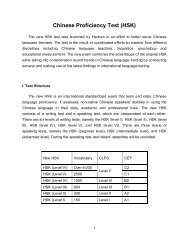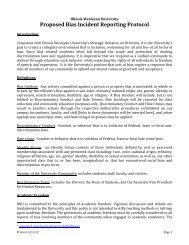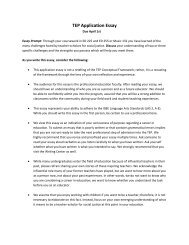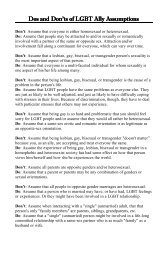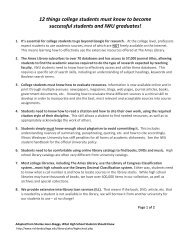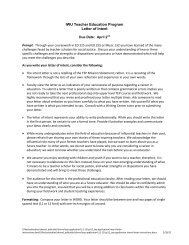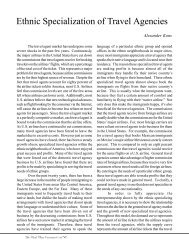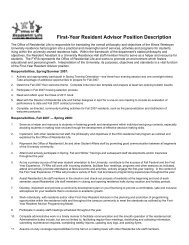Create successful ePaper yourself
Turn your PDF publications into a flip-book with our unique Google optimized e-Paper software.
Kohlberg's stages of moral development - Wikipedia, the free encyclopedia<br />
A dilemma that Kohlberg used in his original research was the druggist's dilemma:<br />
A woman was near death from a unique kind of cancer. There is a drug that might save her. The drug costs<br />
$4,000 per dosage. The sick woman's husband, Heinz, went to everyone he knew to borrow the money and<br />
tried every legal means, but he could only get together about $2,000. He asked the doctor scientist who<br />
discovered the drug for a discount or let him pay later. But the doctor scientist refused.<br />
Should Heinz break into the laboratory to steal the drug for his wife? Why or why not?<br />
From a theoretical point of view, it is not important what the participant thinks that Heinz should do. The point of<br />
interest is the justification that the participant offers. Below are examples of possible arguments that belong to the<br />
six stages. It is important to keep in mind that these arguments are only examples. It is possible that a participant<br />
reaches a completely different conclusion using the same stage of reasoning:<br />
� Stage one (obedience): Heinz should not steal the medicine, because otherwise he will be put in prison.<br />
� Stage two (self-interest): Heinz should steal the medicine, because he will be much happier if he saves his<br />
wife, even if he will have to serve a prison sentence.<br />
� Stage three (conformity): Heinz should steal the medicine, because his wife expects it.<br />
� Stage four (law-and-order): Heinz should not steal the medicine, because the law prohibits stealing.<br />
� Stage five (human rights): Heinz should steal the medicine, because everyone has a right to live, regardless<br />
of the law. Or: Heinz should not steal the medicine, because the scientist has a right to fair compensation.<br />
� Stage six (universal human ethics): Heinz should steal the medicine, because saving a human life is a more<br />
fundamental value than the property rights of another person. Or: Heinz should not steal the medicine,<br />
because that violates the golden rule of honesty and respect.<br />
� Stage seven (transcendental morality): Heinz should not steal the medicine, because he and his wife should<br />
accept the sickness as part of the natural cycle of life-and-death and instead enjoy their time left together.<br />
Theoretical assumptions<br />
The stages of Kohlberg's model refer to reasoning, not to actions or to people themselves. Kohlberg insists that<br />
the form of moral arguments is independent of the content of the arguments. According to Kohlberg, moral<br />
reasoning is a necessary, but not a sufficient, condition for moral action. Additionally, Piaget's stages of cognitive<br />
development are a necessary but not a sufficient condition for the development of moral reasoning. It is important<br />
to remember that he posits justice as the a priori summum bonum (justice is assumed to be equal with moral<br />
virtue).<br />
According to Kohlberg, a person who progresses to a higher stage of moral reasoning cannot skip stages. For<br />
example, a person cannot jump from being concerned mostly with peer opinions (stage three) to being a<br />
proponent of social contracts (stage five). However, when persons encounter a moral dilemma and find their<br />
current level of moral reasoning unsatisfactory, they will look to the next level. Discovery of the limitations of the<br />
current stage of thinking promotes moral development.<br />
Criticism<br />
Page 3 of 4<br />
One criticism of Kohlberg's theory is that it emphasizes justice to the exclusion of other values. As a consequence<br />
of this, it may not adequately address the arguments of people who value other moral aspects of actions. For<br />
example, Carol Gilligan has argued that Kohlberg's theory is overly male-centric. His theory was the result of<br />
empirical research using only male particants. Gilligan argued that Kohlberg's theory therefore did not adequately<br />
describe the concerns of women. She developed an alternative theory of moral reasoning that is based on the<br />
value of care. Although recent research has generally not found any gender differences in moral development,<br />
Gilligan's theory illustrates that theories on moral development do not need to focus on the value of justice.<br />
http://en.wikipedia.org/w/index.php?title=Kohlberg%27s_stages_of_moral_development&...<br />
7/13/2005




